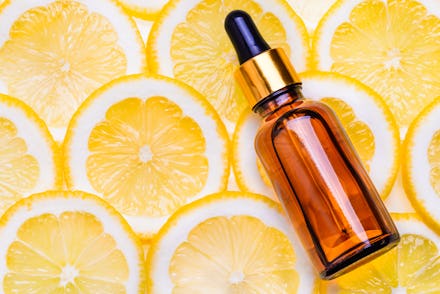Does Vitamin C actually make your skin look better? A dermatologist weighs in

In the skincare world, vitamin C serum has garnered a reputation as a magic wand of sorts, purportedly imbuing everything it touches with a luminous sheen. And while skincare used to be considered women's beauty territory, a much needed cultural shift has deemed it a topic of interest for everyone. Products such as Glossier’s Super Glow, Drunk Elephant’s C-Firma Vitamin C Day Serum, and Glow Recipe’s Pineapple-C Brightening Serum promise bright, youthful, flawless skin. But does vitamin C serum deliver on beauty brands’ marketing claims? Mic spoke with a dermatologist to find out.
First of all, what is vitamin C serum, and what does it do?
A skin serum, simply put, is a product you apply after washing your skin but before moisturizing it. Thanks to its lipid-soluble base, its active ingredients can travel past the surface and into the deeper layers of the skin. In the case of vitamin C serum, the active ingredient, vitamin C, works as an antioxidant that reduces damage due to ultraviolet radiation from sun exposure — such as hyperpigmentation, aging, and sunburn, when used in combination with sunscreen — says Oma Agbai, a dermatologist at UC Davis Health.
Topical vitamin C also inhibits an enzyme that makes the skin pigment, melanin. As a result, it can brighten and even out skin tone, which may be helpful for hyperpigmentation disorders such as melasma — dark patches, usually on the face — as well as post-inflammatory hyperpigmentation — dark spots that can develop from acne, eczema, or other skin conditions. These hyperpigmentation disorders are more common in people with brown and darker skin, says Agbai, who directs UC Davis Health’s clinics for multicultural dermatology and hair disorders.
She adds that while some research evidence exists that topical vitamin C provides these skin benefits, she doesn’t know of any evidence that oral vitamin C (taken as a supplement, for example) has the same benefits.
Do I need vitamin C serum? How important is it to include in my skincare regimen?
The short answer: It can help, but it’s not a must-have, Agbai tells Mic. More crucial are tried-and-true safeguards against hyperpigmentation and other skin damage caused by the sun’s UV rays: applying and regularly re-applying sunscreen with an SPF of at least 30, staying in the shade as much as possible, and avoiding spending time outdoors when the sun shines most intensely (between 10:00 a.m. and 4:00 p.m. according to the Skin Cancer Foundation).
Vitamin C serum “is not harmful as long as you’re not allergic to any of the ingredients,” Agbai says. But while it may help address hyperpigmentation, she doesn’t think it does so as effectively as other interventions. She suggests seeing a dermatologist before throwing down cash for vitamin C serum, since hyperpigmentation can be associated with any number of conditions, such as acne, diabetes, fungal infection, eczema, or psoriasis. A dermatologist can evaluate your skin and may prescribe a more potent treatment that actually tackles the underlying cause of your hyperpigmentation, such as medication designed specifically to treat acne or eczema.
In other words, “vitamin C serum may not be the most appropriate treatment for what you’re trying to clear up,” Agbai says. But she adds that if you can’t tolerate certain prescription medications or worry about the safety of prescription medications, vitamin C serum could work as an alternative.
Basically, if you already have dark spots, vitamin C serum may not be the most effective treatment option, but it could prevent them from emerging in the first place.
On the other hand, Agbai notes that some research suggests that, when used with sunscreen, topical vitamin C can prevent the UV-related skin damage that contributes to hyperpigmentation, and one study has shown it can prevent the hyperpigmentation caused by chemical peels.
Basically, if you already have dark spots, vitamin C serum may not be the most effective treatment option, but it could prevent them from emerging in the first place. Incorporating vitamin C serum into your skincare routine as a preventative measure may be especially important if you’re a person of color, since, again, we’re more prone to hyperpigmentation.
What should I consider when purchasing a vitamin C serum?
Assuming you’re taking something a dermatologist has prescribed to treat the root cause of any hyperpigmentation, or want to prevent hyperpigmentation, look for serums containing at least five to 10% vitamin C, which Agbai says studies have shown to yield the benefits described above. The Drunk Elephant serum mentioned at the beginning of this story, for example, is clearly marked as containing 15% L-ascorbic acid (another term for vitamin C).
And again, remember to use it alongside, not instead of, sunscreen and other protective measures, which are most important for preventing hyperpigmentation. Vitamin C serum may seem like a wondrous elixir, but like any product, it seems to work best in certain contexts.